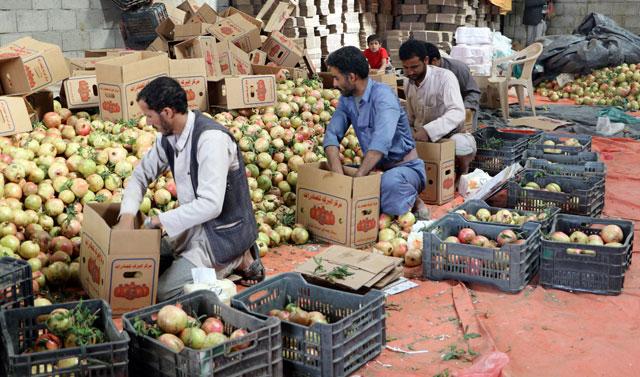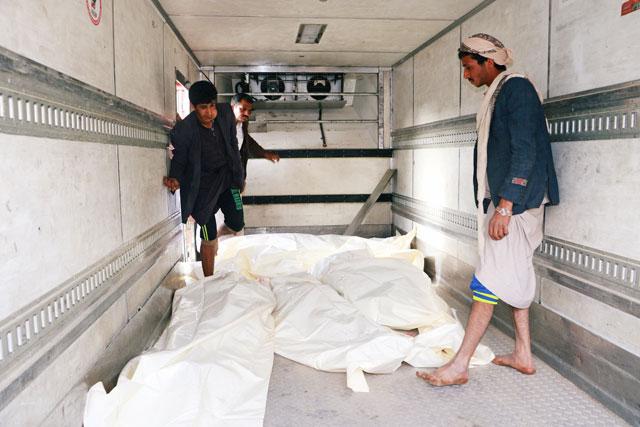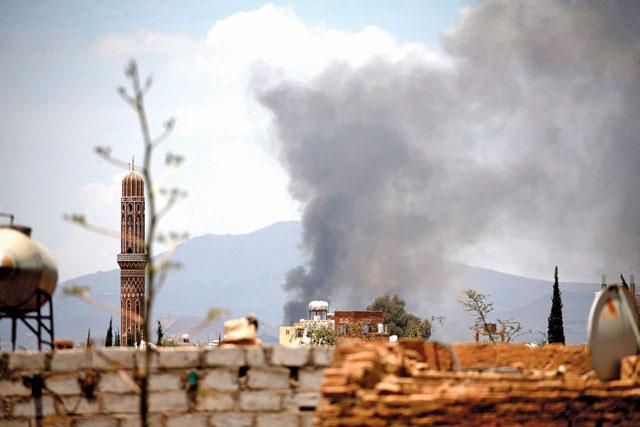You are here
Humble pomegranate seed provides clue to Yemen's hunger crisis
By Reuters - Oct 22,2018 - Last updated at Oct 22,2018

Workers pack pomegranates for export in Saada, Yemen, on September 25 (Reuters photo)
SAADA, Yemen — The tiny, red pomegranate seed may not look like much but it helps explain why Yemen's civil war has brought millions of people to the brink of famine.
Pomegranate exports were a key source of income for people in Saada in northwest Yemen, a province under the control of the Houthi movement aligned with Iran. Before the war began in 2015, farmers exported 30,000 tonnes of the fruit.
Those exports have fallen by around a third and farmers blame lack of fuel and water for irrigation and the impact of aerial bombing by a coalition of forces led by Saudi Arabia and armed by the United States, France, Britain and other Western countries.
Markets and roads have been targeted, making it much more dangerous and, crucially, more expensive to get pomegranates by truck to Yemen's main port in Hodeida, the farmers say.
The coalition is fighting to restore the internationally-recognised government that was ousted from the capital Sanaa by the Houthis. Many bombs have fallen on civilian areas. The coalition denies targeting civilians deliberately.
"The pomegranates are dying because of lack of water because of the blockade," said farmer Rabeea Al Abdy.
He was referring to stringent measures put in place by the coalition on imports into Yemen that have slowed trade flows, including of commercial goods and vital supplies such as fuel, medicine and humanitarian aid.
The coalition says the measures are necessary to prevent the Houthis smuggling in weapons from Iran. Both the Houthis and Iran deny engaging in such smuggling.
Ali Saleh, an agricultural sales manager in Saada, said exports are down by a third from their pre-war peak.
"The war... led to a rise in the prices of fuel. Farming necessities... have seen a crazy rise in prices in comparison to the farmers' costs which has had a huge impact on production," he said.
Three-quarters of the Yemeni population, or 22 million people, require aid and 8.4 million people are on the brink of starvation, according to UN special envoy Martin Griffiths.
The United Nations is trying to broker talks to end the war but in the interim aid officials say the key to reducing the risk of famine is not charity but improving the economy: Exports of the humble pomegranate could be a small part of the answer.
Related Articles
DUBAI — Air strikes killed nine civilians and wounded at least 6 on Wednesday in two separate attacks in north and west Yemen by the Saudi-l
ADEN, Yemen — The battle for the Yemeni province of Saada is heating up, military leaders said on Thursday, as a Saudi-led alliance turns it
SANAA — Efforts to bring Yemen's warring factions together to discuss their conflict have made some progress, officials said on Monday, as w
















